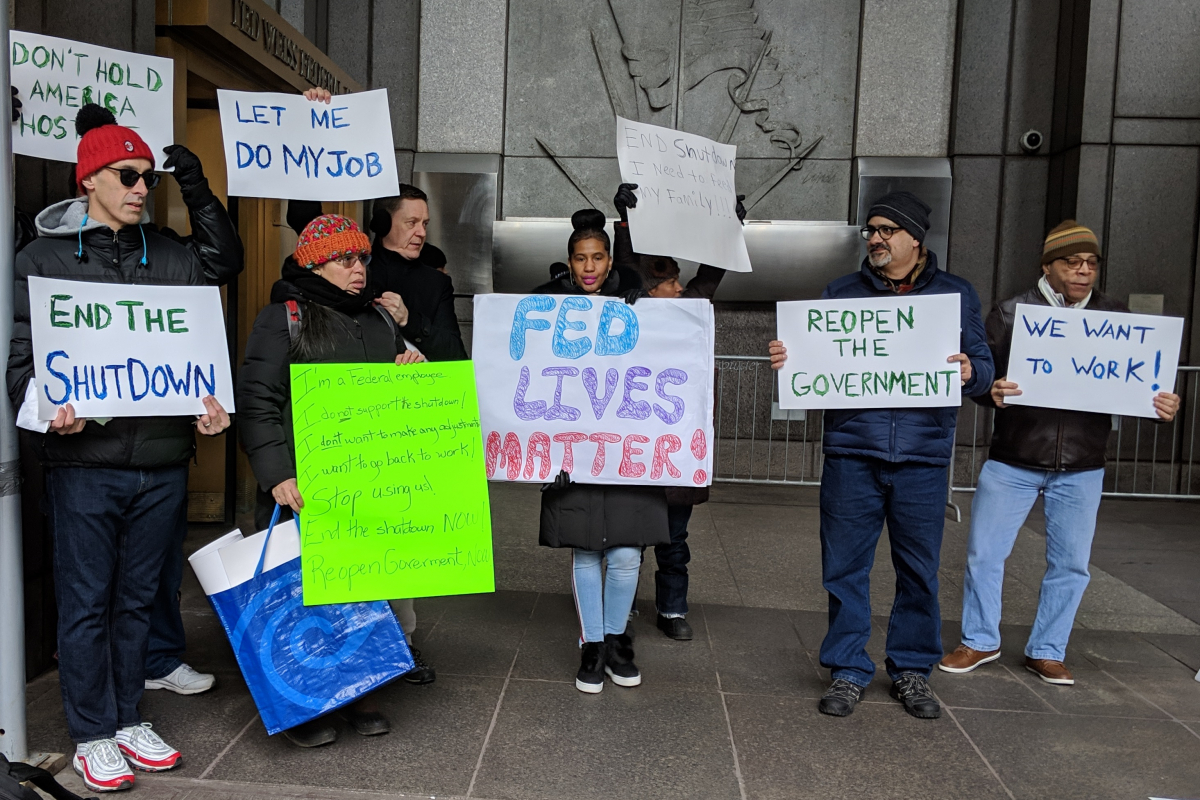Federal Workers Pivot from Shutdown to Defeat Childcare Cuts

IFPTE Local 98 members joined other federal workers in lower Manhattan to protest the January shutdown. Photo: Saurav Sarkar.
How do you springboard organizing momentum from one issue fight into another? Federal workers in New York City did it when they harnessed members’ energy from a government shutdown solidarity campaign to push back against cuts to their own childcare subsidies.
The 35-day government shutdown began in December 2018, locking out hundreds of thousands of federal employees and contractors and forcing others to come to work without pay.
In New York City, small groups of workers from across the federal government came together to protest. They included workers who were furloughed across many agencies as well as members of Professional and Technical Employees (IFPTE) Local 98 who work as engineers, regulators, planners, and administrative staff at the Army Corps of Engineers. The latter group remained fully paid and on duty throughout the shutdown.
“We know that this could happen to us in the future. We wanted to show that even though we weren’t in pain, we were united with them in their pain,” said Local 98 President Franco DiCroce.
The rallies were small at first, but they built to a big after-work rally with 150 workers and supporters on January 25—by chance, the same day the shutdown ended.
ON TO THE NEXT FIGHT
But Local 98 used the momentum from its shutdown solidarity efforts to build resistance to a proposed cut to childcare subsidies.
The Secretary of the Army had issued a directive to completely cut a childcare subsidy for all new children of civilian employees on November 30. Even though the directive instructed Army bosses to inform workers within 30 days, many affected workers did not find out until late January, just a month before the cuts were set to go into effect.
Currently, the Army Corps offers a childcare subsidy of up to $1,500 per month per child. Workers cite the benefit, along with others, as a tradeoff for a relatively low public sector salary for engineers and other professionals.

SUPPORT LABOR NOTES
BECOME A MONTHLY DONOR
Give $10 a month or more and get our "Fight the Boss, Build the Union" T-shirt.
Federal workers in New York face a particular pay squeeze. The city is notoriously expensive, but because federal locality pay to adjust for regional cost of living is based on the average cost within a 50-mile radius of the workplace, New Yorkers get a lower regional adjustment than many other areas.
DEFENDING THEMSELVES
Thanks to the organizing around the shutdown, members’ perception of the union had already improved. Because the local’s organizing “muscles” were in shape, it was able to respond to the cuts quickly. And although the shutdown was a negative experience for affected workers, it drove home the necessity for federal workers to stand up for themselves.
“We are the ones who make this country move and operate. The federal government is punishing its own workforce. If we go away the country can’t move,” DiCroce said.
Members of Local 98 spoke up against the cuts in two employee town hall meetings, one in New York and one conducted online. For many workers, this was the first time ever confronting the boss. At the online meeting, Local 98 activists made connections with Army Corps workers in other locals across the country. Together, through their locals, they encouraged IFPTE’s national leadership to contact members of Congress and the press about the proposed cuts.
At the same time, Local 98 members began to make phone calls, write emails, and schedule in-person meetings with senior management. They were professional but firm: these cuts were a problem.
ARMY BACKS DOWN
The day before the childcare cuts were due to go into effect, the Army temporarily rescinded its proposal. Workers have notched a victory, but they know the fight isn’t over. With new skills, contacts, and confidence, they are keeping the pressure up. And they’re preparing to fight again if the cuts are reintroduced.
Local 98’s response to other union members’ hardship in the face of the shutdown was important on its own merits. But the organizing also built the local itself so it was stronger when it came time for its own fight.
Ben Beckett works in the library at New York University and is a steward in UCATS, Teachers Local 3882.





